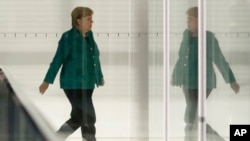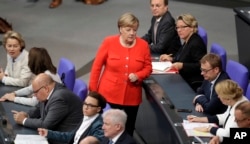German Chancellor Angela Merkel is highly respected internationally - a new poll published Monday had her as the most popular world leader - but at home the "Iron Lady" of German politics is increasingly beleaguered and even her most faithful supporters are not convinced she will be able to see out her full electoral term ending in 2021.
Since her Christian Democrat party’s dismal performance in last year's parliamentary elections she’s been beset by one crisis after another. Last month she lost her key parliamentary henchman, Volker Kauder, the head of Merkel’s Christian Democratic Union (CDU) and its Bavarian sister party, the Christian Social Union (CSU), in the German Bundestag.
That prompted Germany’s biggest-selling newspaper, Bild, to ask: “Can Merkel still be chancellor?”
Disgruntled CDU lawmakers replaced Kauder with Ralph Brinkhaus, a member of a powerful faction within the party, which is dissatisfied with Merkel’s centrist and pro-European Union policies and wants to shift rightwards to counter the far-right party Alternative for Germany, or AfD.
The AfD is now running second, ahead of the left wing Social Democrats in opinion polls.
This week Merkel hopes to solve the latest crisis assailing her with a highly complex compromise deal to keep diesel cars on the road. The deal, due to be announced later Tuesday, is the culmination of a longstanding quarrel over the fate of German car owners whose vehicles were fitted by German auto manufacturers with manipulative recording software disguising their high pollution levels.
German courts paved the way for city driving bans on diesel cars to be instituted. The key political challenge for Merkel with the so-called Dieselgate scandal has been how to reduce pollution without offending powerful interests, car-owners or the auto industry. At the heart of negotiations on what to do has been the question of whether the industry would be made to foot the full costs for retrofitting old cars or replacing them, or if consumers would have to shoulder some of the expense.
She has not been helped in finding a solution by the squabbling factions within her shaky coalition government, which includes the left wing Social Democrats, or SPD. The fallout from the deal, say analysts, could impact regional elections this month in the states of Bavaria and Hesse. Local Christian Democratic parties are expected to fare poorly, but how badly will be crucial for Merkel’s own future prospects, let alone her party’s.
‘Lame duck’
With the setbacks she is being seen within her own party as a weakened leader. Last week, European Budget Commissioner Guenther Oettinger, a prominent Christian Democrat, dubbed Merkel “a lame duck,” saying her political influence is diminishing quickly.
Merkel’s political demise has been predicted many times, notably at the height of the public backlash in 2015 over her “open-door” immigration policy, which contributed heavily, pollsters say, to her party's reduced share of the vote in last September’s elections.
Andrew Bulkeley, a Berlin-based editor for Handelsblatt Global, noted recently, “The media have been calling the end of Merkel almost since the day she took office.” He argues her political skill has always been based on “muddling through, so much so that in German the verb ‘to Merkel’ means just that. But more and more Merkeling looks like successful compromise, not just muddling through.”
But the challenges to Merkel’s rule and the complexities she faces in securing compromises within her fractious governing alliance are of a different magnitude than in the past, say other observers. Week after week, her 13-year rule has appeared to be on the line.
In June, interior minister Horst Seehofer, a member of the CSU, the junior partner in the coalition government, mounted a potentially fatal challenge to her authority by threatening to close Germany’s borders to migrants and to order police to turn back asylum seekers, unless she secured a broader EU deal on distributing migrants more evenly.
Last month, Merkel offered a rare public apology over her handling of a quarrel involving former intelligence chief Hans-Georg Maassen, who called into question the authenticity of footage showing far-right sympathizers chasing migrants in the eastern city of Chemnitz.
And on Tuesday Merkel’s coalition was shaken by the disclosure that German arms exports to Saudi Arabia had doubled, despite a pledge she made to withhold weapons from any combatants in the war in Yemen.
Social Democrat lawmakers say the $250 million in arms sales in the six months since March are “impossible to square with the coalition contract” Merkel agreed to in order to get them to join her governing alliance.





